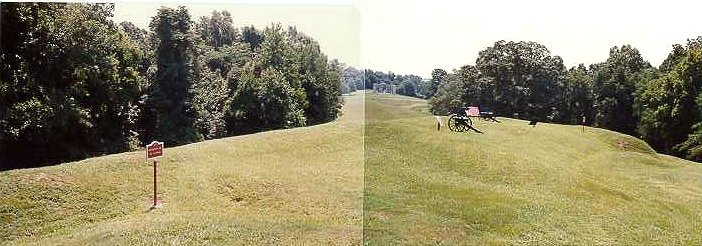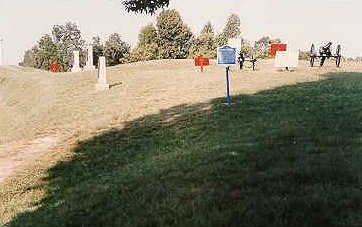
Vicksburg Part 3
May 19 to July 4, 1863

Railroad Redoubt
Further south, Gen. McClernand, a political general, did better than both McPherson and Sherman, both of whom committed only a fraction of their forces. McClernand committed his entire force and had no reserve to reinforce his successes.
This is the view from the Railroad Redoubt, which protected the entrance of a railroad into the defenses. Further north, Unionists took the Rebel line between here and the 2nd Texas Lunette. Here at the Railroad Redoubt, the Federals reached the fort's ditch and a small group of men from the 22nd Iowa entered the fort. Sgt. Griffith commanding them was the only one of them to come back out, but with twelve prisoners. Although the attack here had promise, Confederate reinforcements brought the situation under control.

3rd La. Redan
With the failure of the attacks on May 19th and 22nd, Grant's army settled down to a siege. In the area of the 3rd La. Redan, a mine was begun, and on June 25th, 2200 pounds of powder exploded beneath the fort. A crater 12 feet deep and 40 feet around was now where the Confederate line had been. All the artillery and small arms in Grant's army opened up and Union infantry advanced into the redan.
This picture is the Union view of the redan, with a cut along the Jackson Road on the left and the fort on the right. The attacking Federals found that the Confederates manned a new line behind the crater. These Rebel delieved a devastating fire on the attackers who were soon pinned down in the crater. The attack ground to a halt but the Yankees stayed until Confederate hand grenades forced them to withdraw the next day. Another mine was exploded on July 1st, but there was no assault.

Fort Hill
This is the view from Fort Hill, the northernmost fort in the Confederate line. You can see how the hills of Vicksburg dominate the river below. With Vicksburg in Union hands, the Mississippi would be open to Union ships and the Confederacy would be split in two. This was soon the case. With the Confederate army nearing starvation, Pemberton decided to surrender. On July 4, 1863, the Confederates marched out, gave up their arms, and were paroled.